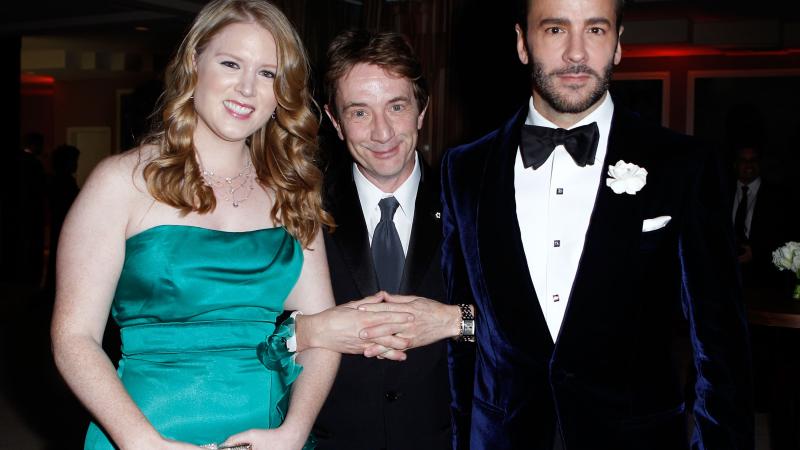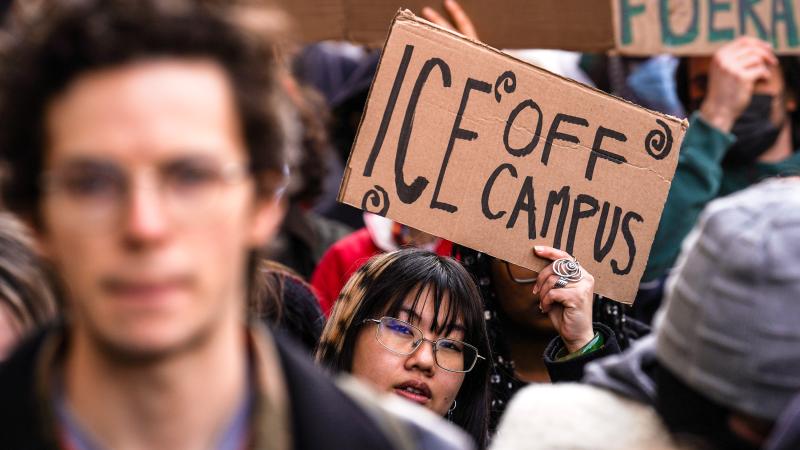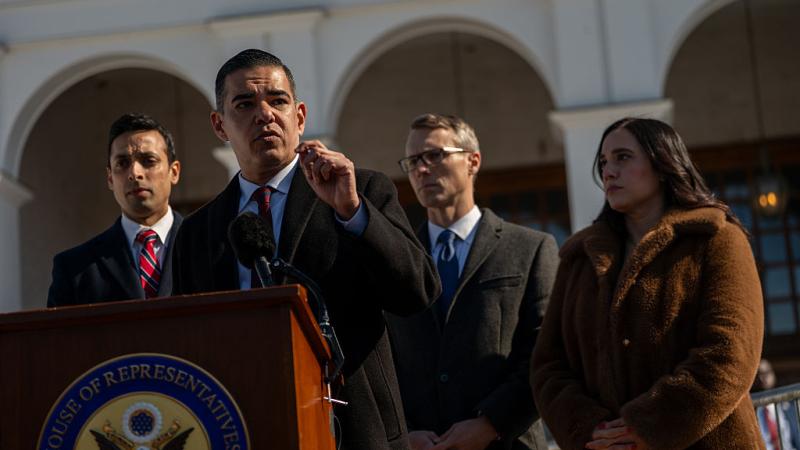'Fight Club' bows to censorship for Chinese release, while Keanu Reeves stands ground on Tibet
Notoriously anti-authority film's ending is neutered for Chinese release, in the latest example of Hollywood yielding creative freedom to appease ruling Chinese Communist Party and retain lucrative access to vast film market.
Hollywood is remaining largely silent on the cult classic film "Fight Club" getting an entirely different ending for release in China, continuing a years-long pattern of the U.S. film industry appeasing Chinese authorities to maintain lucrative access to China's vast market.
However, amid charges of Hollywood "selling out" to China, a tiny number of actors and directors — most recently film star Keanu Reeves — have refused to submit to China's demands to toe the line of the ruling Chinese Communist Party.
"Fight Club," a 1999 film by David Fincher, shocked audiences when it hit theaters. The movie ends with the narrator, played by Edward Norton, killing his split personality Tyler Durden, played by Brad Pitt.
In the final scene, the narrator stands with his girlfriend, watching his plan to destroy consumerism by erasing bank and debt records come to fruition as his followers detonate explosives to destroy several skyscrapers.
This vision of anarchy — and the state's inability to stop it — appears to have crossed a line to be shown in China, where the government exercises tight control over speech and creative freedom.
The version of "Fight Club" released in China has a completely different ending, which was recently discovered by fans who viewed the film on the Chinese streaming site Tencent Video.
In the alternate ending, the entire scene featuring exploding buildings is cut out and replaced to have the authorities win. Specifically, the film closes with a blank screen showing a few sentences of text.
"Through the clue provided by Tyler, the police rapidly figured out the whole plan and arrested all criminals, successfully preventing the bomb from exploding," the message says. "After the trial, Tyler was sent to a lunatic asylum receiving psychological treatment. He was discharged from the hospital in 2012."
It's unclear whether the ending was altered by direct government order or out of self-censorship expecting the government would find the closing scene problematic. China has notoriously strict censorship rules to ensure all films and other forms of entertainment reflect what the Communist Party deems correct and appropriate.
Tencent, the giant Chinese entertainment company which owns Tencent Video, didn't respond to a request for comment.
According to Vice, the film was edited by the copyright owner and then approved by the government before it was sold to streaming sites.
The Chinese distributor of "Fight Club" is Pacific Audio & Video Co., according to the version available on Tencent Video. Pacific Audio & Video Co. is an affiliate of the state-owned Guangdong TV.
While Hollywood has so far been silent on China's changes to the film, critics and activists have not.
"Dystopian," said Human Rights Watch. "The first rule of Fight Club in China? Don't mention the original ending. The second rule of Fight Club in China? Change it so the police win."
Sen. Ted Cruz (R-Texas) had a similar response.
"The second rule of Fight Club is 'we will do and say whatever the Chinese communist censors tell us to do and say,'" he tweeted.
Others have criticized those directly involved in "Fight Club" for not speaking out.
"There's no good reason for David Fincher or Edward Norton or Brad Pitt to be silent about the mutilation of the film," wrote Sonny Bunch, culture editor of the Bulwark. "There's no good reason that they shouldn't be penning op-eds for Variety denouncing this and demanding that it cease. There's no good reason this defacement for the sake of state control should be allowed to pass unremarked."
It's unclear whether the film's U.S. production company discussed censorship when it sold the distribution rights in China. New Regency, the Los Angeles-based company that produced "Fight Club," didn't respond to a request for comment.
"Fight Club" is hardly the first U.S. movie to be altered — often substantially — in China to conform to the Communist Party's ideological dictates and push a message of order and obedience.
In "Lord of War," a film starring Nicholas Cage, the protagonist evades jail time and returns to arms trafficking. But the Chinese version on Tencent Video replaces that ending with a caption saying the arms dealer "confessed all the crimes officially charged against him in court, and was sentenced to life imprisonment in the end."
When the Oscar-winning Freddie Mercury biopic "Bohemian Rhapsody" was released in China in 2019, to cite another example, all mentions of the Queen singer's sexuality and AIDS diagnosis were edited out.
As with "Fight Club," Hollywood has, for the most part, quietly accepted such changes. According to Wendy Su, an associate professor of media and cultural studies at UC Riverside, there's one overarching reason why: "the vast Chinese market and the potential for greater profits."
Bunch cited the same motivation in his stinging criticism of Pitt, Norton, and Fincher, saying there's a reason for them to remain silent about the changes to their film: "fear of Chinese retaliation against their films in the future. Fear of losing money. Fear of losing jobs. Fear of financial duress."
China, which boasts a massive consumer market, has refused to show several American films for various reasons — some arbitrary, some overtly political. In such cases, the Americans involved in the film lose out on a potentially significant source of money. The Chinese box office has become a major determinant of a studio's success or failure.
Fear of losing the Chinese market and a desire to enjoy its financial benefits has led Hollywood to practice "anticipatory self-censorship," according to James Tager, the research director at PEN America, a nonprofit that promotes free expression.
PEN America published a major report in 2020 showing the U.S. film industry self-censors its content to appease the Chinese government.
In 2012, for example, the producers behind the remake of the 1984 film "Red Dawn" replaced the Chinese with the North Koreans as the villains, changing dialogue and digitally erasing Chinese flags and military symbols.
More recently, the sequel of "Top Gun" removed the Japanese and Taiwanese flags from the main character's jacket in an apparent concession to Beijing, which views Japan as a rival and Taiwan as a renegade Chinese province.
Last year, actor John Cena apologized to China for calling Taiwan a country while promoting a new movie.
Not everyone in Hollywood has bowed to Beijing, however.
American filmmaker Judd Apatow has called out his colleagues for appeasing China, saying the Chinese government has "bought our silence with their money."
Legendary director Quentin Tarantino refused to delete a scene from his movie "Once Upon a Time ... in Hollywood" that China was unhappy with. "To actually remove an entire scene because the country finds that scene objectionable? No," he said in 2020.
Most recently, actor Keanu Reeves has stood firm in his public stance supporting Tibet, which China views as part of the Chinese mainland and controls through oppression.
Reeves agreed to perform at a benefit concert hosted by Tibet House US, an international group of nonprofit organizations that promotes Tibetan culture. In response, Chinese nationalists have threatened to boycott Reeves' new film "The Matrix Resurrections," the fourth installment in the sci-fi franchise, as well as his other films.
"The Matrix Resurrections" already performed poorly at the Chinese box office before Reeves' involvement in the pro-Tibet event came to light. Moving forward, the question is whether Reeves will be put on China's blacklist for future projects.
According to Chris Fenton, who had done extensive business with China as president of DMG Entertainment Motion Picture Group and GM of DMG North America for 17 years, the entertainment industry needs a figure willing to stand up to China no matter the initial financial cost to become a larger-than-life figure.
"As Hollywood's risk-reward calculus for China starts to get muddier and muddier, there's a move for an entity, whether it's a celebrity, athlete, or company, to essentially do what Muhammad Ali did, which is to take a direct hit, short-term, on revenue but long-term create a brand that's bigger than what they were originally known for," Fenton wrote in his 2020 book, "Feeding the Dragon: Inside the Trillion Dollar Dilemma Facing Hollywood, the NBA, & American Business."














